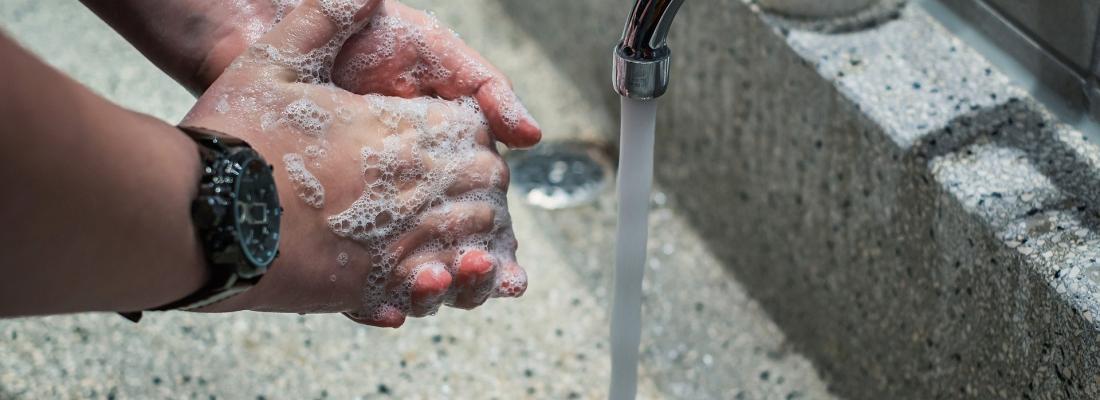Food, Global Health Reading time 2 min
Food safety and meat preparation: hand hygiene of Europeans at the heart of prevention
Published on 11 May 2021

Hand washing seems to be a simple task but, once implemented, shows discrepancies between people. Some people diligently wash their hands for 30 seconds with soap, others simply run their hands under water, or just wipe their hands on a cloth or towel. The issue of hand washing is particularly important when handling raw meat, to prevent foodborne infections caused by pathogenic bacteria present on raw meat — Campylobacter and Salmonella in particular — via "cross-contamination" events. Indeed, these bacteria will be killed by the cooking of the meat, but they can infect consumers if they put their hands to their mouths after handling raw meat, or if they contaminate with their soiled hands a food eaten raw (a salad for example).
Do Europeans really wash their hands?
Among the poor performers - the Portuguese, French and Romanians - fewer than 2 out of 15 people washed their hands with soap after handling raw chicken.
As part of the EU Horizon 2020 funded consortium SafeConsume, researchers from INRAE and the ESA (École Supérieure d’Agricultures d’Angers) conducted a study in 5 European countries — Portugal, France, Norway, Romania and UK — which consisted on observing 15 consumers per country during the preparation of a meal from raw chicken and salad, and interviewing a sample of 1889 Europeans via Internet. Their results show clear differences between European countries in chicken handling and handwashing practices, even though self-reported handwashing practices are similar between countries, revealing a gap between intentions and practices. These differences are associated with disparities in material aspects (kitchen equipment, type of chicken purchased, whole or filleted), know-how (cooking recipes, chicken washing, use or non-use of soap) and knowledge (microbiological risks associated with raw meat, importance of soap). The English and Norwegians are the good students here, since they declare that they know that raw chicken can make you sick and therefore wash their hands with soap after handling it. Among the poor performers — the Portuguese, French and Romanians — fewer than 2 out of 15 people washed their hands with soap after handling raw chicken. Many of them do not seem to know the importance of soap for washing their hands, and just run them under water. Others use soap on different occasions during meal preparation—before cooking, after touching the bin, their phone, handling pets or blowing their nose — but not after handling raw chicken because they are not aware of the risks from raw chicken. Poorly equipped kitchens and inaccessible soap were also associated with not washing hands.
These results highlight the importance of considering all the different aspects involved — material, knowledge and know-how — to develop an appropriate communication strategy to improve consumer handwashing practices and reduce foodborne infections, both bacterial and viral.
The art and the way to wash your hands:
Remember that to fight against the transmission of viruses and bacteria it is necessary to wash your hands with soap and water for 30 seconds. Visit Santé Publique France for more information.
|
Reference Pierrine Didier, Christophe Nguyen-The, Lydia Martens, Mike Foden, Loredana Dumitrascu, Augustin Octavian Mihalache, Anca Ioana Nicolau, Silje Elisabeth Skuland, Monica Truninger, Luís Junqueira, Isabelle Maitre, Washing hands and risk of cross-contamination during chicken preparation among domestic practitioners in five European countries, Food Control, Volume 127, 2021, 108062,ISSN 0956-7135, https://doi.org/10.1016/j.foodcont.2021.108062. |
|

Project H2020 n° 727580 |
This study was conducted as part of the H2020 SafeConsume project (2017-2022), which aims to study and improve consumer practices related to foodborne risks. It combines the results of a large-scale online survey conducted in 2019 and anthropological surveys conducted in 2018 with consumers in their food shopping and preparation practices. The work is the result of a close collaboration between microbiologists and sociologists/anthropologists. This work was conducted prior to the COVID 19 crisis, but the issue of handwashing has taken on particular resonance since. |
